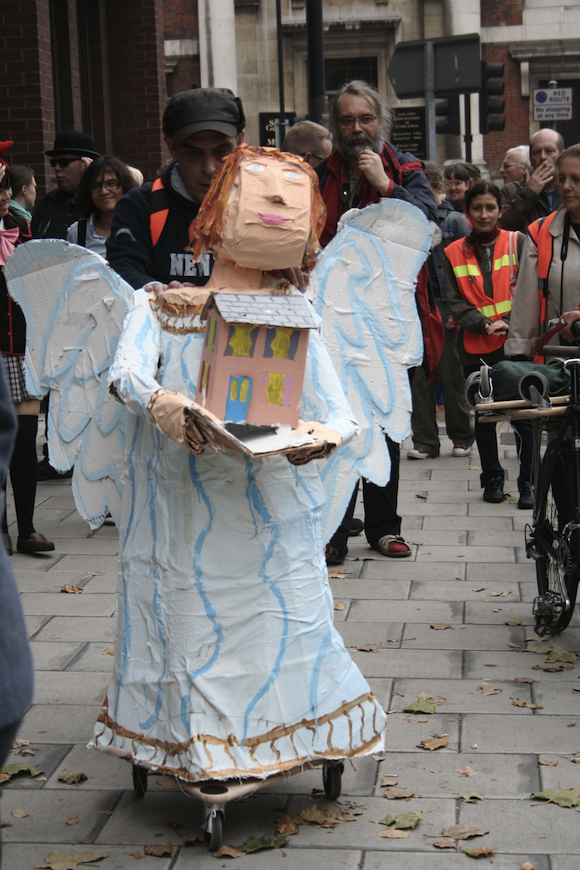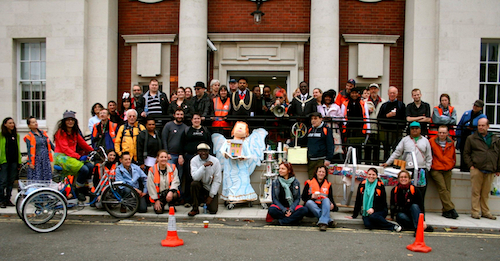Today the Dilnot commission on social care published its conclusions in its Fairer Care Funding report. Among its findings are that care costs should be capped and the means-tested threshold increased under major changes to the funding of adult social care in England.
The report is a chance to finally fix a shattered system, there will be widespready reaction and analysis later today and beyond to what Dilnot himself calls a once-in-a-lifetime chance to overhaul social care but for now, here’s a selection of today’s responses which I’ll try and update throughout the day.
Sue Brown, Head of Public Policy at the national deafblind charity Sense: “Sense welcomes the Dilnot report, and in particular the key finding that additional public funding for adult social care is urgently required. But we are concerned that the media focus is only on older people which obscures some critical aspects. We believe the report clearly shows that not only can the Government afford to support disabled people of all ages, but crucially as a society we can’t afford not to. It is now up to the Government to fund adult social care so that it gives disabled people of all ages quality of life. For deafblind people social care means communication and mobility support, not just personal care.”
Julia Unwin, the Chief Executive of JRF and the Joseph Rowntree Housing Trust (a non-for-profit provider of housing and care services): “Today marks the most concrete and credible step for years. I believe that the proposed reforms have the potential to bring about a radical step-change in how we value social care, how we think about disability, and how we all – as individuals and as a society – plan and prepare for longer lives.
It is positive to hear commitments from all the main parties to set aside party differences and consider the Dilnot report with the consideration it clearly warrants.
The JRF now urges the Coalition Government to abide by its promises to deliver a White Paper in the next six to nine months. It would be a tragedy for this, one of the most pressing and defining issues of our age, to be kicked, yet again, into the long grass.”
Jeremy Hughes, Chief Executive, Alzheimer’s Society: “Today’s welcome report could bring to an end the scandal of the colossal Dementia Tax where every year tens of thousands of families are left to pay all their care costs whilst other diseases are paid for by the NHS. The government mustn’t miss this opportunity to right a wrong that is destroying lives. In a new system we must end the postcode lottery that gives different support depending on local authority. The Dilnot Commission has given the coalition government the opportunity to show that it is a caring government. Pending implementation they must also show they care, protecting social care spending in the way they are doing for health.”
TUC General Secretary Brendan Barber: “The TUC welcomes the increase in funding for the care of the elderly over the next few years, and the news that social care will be free for those who become disabled before the age of 40.
“The introduction of a national eligibility assessment should avoid a ‘postcode lottery’ and make it possible for those receiving social care to move around the country without losing their care provision.
“The TUC believes that social care should be provided free for those who need it, and funded from general taxation. The Dilnot Commission’s proposals could, however, be transformed into this NHS model by continually reducing the level of the cap on care costs. The government must not set too high a cap – a level above £50,000 per person would mean that families could still face losing their homes to pay for the vital care they need.”
Gordon Morris, managing director of Age UK Enterprises: “The Dilnot commission report delivers a clear call to action to the financial services industry to work with government to develop the innovative products needed to fund long-term care. Existing products, such as equity release and annuities, could present a solution, but far more has to be done to build flexibility into these products to increase access and ensure these products evolve to meet changing financial needs.”
Stephen Burke, founder of social enterprise United for All Ages: “Under the commission’s regressive proposals, the winners would be richer families whose inheritance will be relatively protected, while most families will face a more confusing and potentially costly care system. The proposed cap on care costs will still result in some older people being forced to sell their homes to pay for care and related costs.
“The proposals aim to reform the current inadequate system for funding care. But they would lead to a more complex, fragmented and confusing care system … This could be seen as a care ‘poll tax’ for the so-called squeezed middle.”
An interesting reaction from by social worker “Sarah Smith“: “It is local authorities that take the hit from policies devised by central government, and we can only hope that all parties are brave enough to act together for the country’s interests rather than consider of their own chances at the ballot box. We deserve much better than that.”
Labour leader Ed Miliband: “The last thing Britain needs is for Andrew Dilnot’s proposals to be put into the long grass. We three party leaders are of similar age and the same generation. This is a once-in-a-generation opportunity which our generation must address.”
Which? executive director Richard Lloyd: “Consumers tell us that long-term care is their top health care priority* so we welcome these recommendations and urge the Government to act sooner rather than later. If private insurance is to play a part in funding long-term care, then we need to learn lessons from the past, where products have either failed to meet people’s needs or have been mis-sold. This will be a new market with a clean slate so it’s important that strong consumer protection is in place from the start.”
Michelle Mitchell, charity director at Age UK, tells the Guardian that the report set out “a clear blueprint” for sustainable reform. Production of a white paper by next spring was ambitious but achievable, Mitchell said. But she warned: “Delay beyond Easter would be indefensible.”
Mark Goldring, chief executive of learning disability charity Mencap, said: “Now is the time for monumental change and it is vital that the government does not bury social care reform.”
John Adams, Voluntary Organisations Disability Group (VODG) general secretary: “Today is about more simply demanding more money – vital though additional funding is – it is about urgent reform of a broken system. The Dilnot commission has taken great pains to build cross-party consensus; ministers now need to match the warm rhetoric with which they greeted today’s report with swift action. The government must find the courage to put its money where its mouth is, succeed where previous administrations have failed and exploit what Dilnot himself describes as a “once-in-a-lifetime opportunity” to create a fair and sustainable system of social care.”
Senior Fellow at The King’s Fund, Richard Humphries: “The budget deficit should not be used as a reason for inaction. This is a long-term issue and questions of affordability go beyond the current economic situation. The additional public expenditure needed to fund these proposals is less than 0.25 per cent of gross domestic product – this should not be too high a price to pay for providing a care system fit for the 21st century….Where they have failed in the past, politicians from all parties must now seize the best opportunity in a generation to ensure that people can access the care and support they deserve in later life.”
Su Sayer, learning disability charity United Response’s chief executive: “The report’s recommendations are the first step towards creating a better system which ensures that people in need of care receive it, funded in a way that is not only fair, but seen to be fair….Whether viewing this economically or morally, we cannot afford to ignore these recommendations, which is why we urge all political parties to work together towards a better social care system for all.”
Guy Parckar, acting director of policy, campaigns and communications at Leonard Cheshire Disability: “The system as it stands is creaking at the seams, with more and more people missing out on the care that they need. This report must be seen as a clear call for action. All of the political parties must come together with one agenda and that is to agree a fairer settlement for social care. We cannot go on with disabled and older people missing out on care because of a system that simply cannot cope with the demands placed upon it…Too often disabled people with significant social care needs can be charged into poverty by our social care system. People are unable to work, unable to save, unable to buy a home as any income or assets will simply be taken to cover the costs of care. This is a critically important recommendation that could make an immense difference, and it is absolutely imperative that the Government acts on it.”
Domini Gunn, Chartered Institute of Housing (CIH) Director of Public Health and Vulnerable Communities: “In reforming the funding of social care, we urge the government to follow Dilnot’s recommendation to review the scope for improving the integration of adult social care with wider care and support system. This must include housing, and housing support, providers and could help drive a more preventative approach, incentivised through funding arrangements.”
Sir Stuart Etherington, Chief Executive of NCVO: “This review makes major strides towards identifying how we can achieve an affordable, sustainable and fair funding system for all adults in the UK. The challenge now falls to all parties to resist turning the review into a political football and to prioritise responding swiftly and decisively. It is the most vulnerable who will suffer if we cannot seize this golden opportunity to improve the funding of adult social care.”







